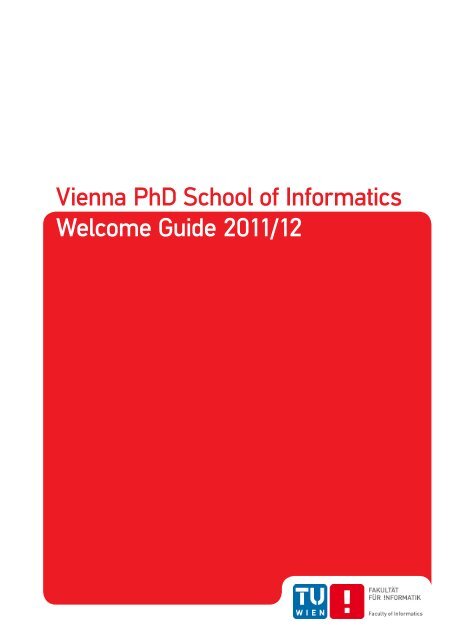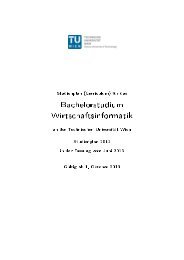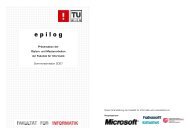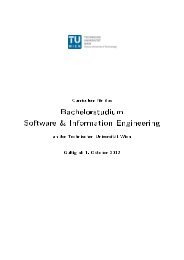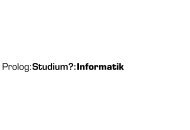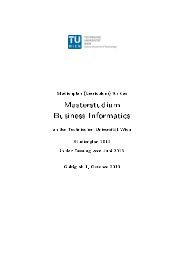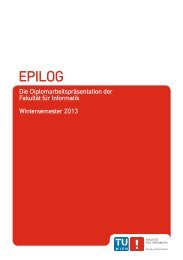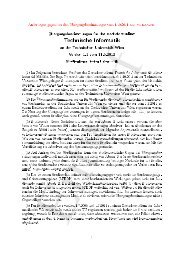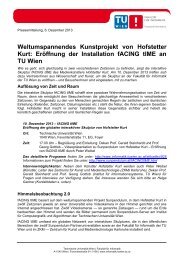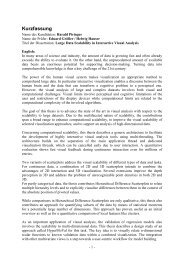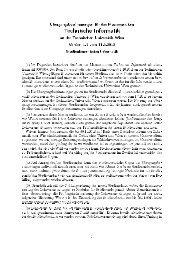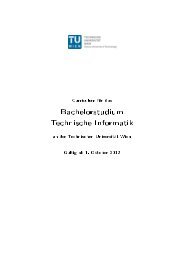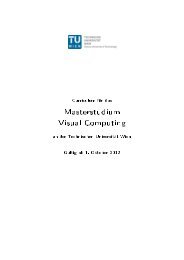Vienna PhD School of Informatics Welcome Guide 2011/12
Vienna PhD School of Informatics Welcome Guide 2011/12
Vienna PhD School of Informatics Welcome Guide 2011/12
Create successful ePaper yourself
Turn your PDF publications into a flip-book with our unique Google optimized e-Paper software.
<strong>Vienna</strong> <strong>PhD</strong> <strong>School</strong> <strong>of</strong> <strong>Informatics</strong><br />
<strong>Welcome</strong> <strong>Guide</strong> <strong>2011</strong>/<strong>12</strong>
FACULTY OF !NFORMATICS<br />
IMPRINT<br />
Coordination and Communication Center<br />
<strong>of</strong> the Faculty <strong>of</strong> <strong>Informatics</strong><br />
1040 <strong>Vienna</strong>, Favoritenstraße 9/195<br />
www.informatik.tuwien.ac.at<br />
(c) <strong>2011</strong> <strong>Vienna</strong> University <strong>of</strong> Technology<br />
Faculty <strong>of</strong> <strong>Informatics</strong><br />
2 | 21
Table <strong>of</strong> Contents<br />
Preface ................................................................................................................................................... 5<br />
Dean’s <strong>Welcome</strong> ................................................................................................................................. 5<br />
Contact Information ......................................................................................................................... 5<br />
Arriving in <strong>Vienna</strong> ................................................................................................................................... 6<br />
Getting there and away from <strong>Vienna</strong> International Airport (VIE) .............................................................. 6<br />
Arriving at the Train Station .................................................................................................................. 6<br />
Getting Settled ....................................................................................................................................... 7<br />
About Austria ...................................................................................................................................... 7<br />
Currency and Payment ...................................................................................................................... 8<br />
Electricity ......................................................................................................................................... 8<br />
Time Zone ....................................................................................................................................... 8<br />
Climate and Weather in Austria ......................................................................................................... 8<br />
Drinking Water ................................................................................................................................. 8<br />
Drugs and Cigarettes ........................................................................................................................ 8<br />
Entry and Residence Regulations .......................................................................................................... 9<br />
Registration in Austria ...................................................................................................................... 9<br />
Health Insurance ................................................................................................................................. 9<br />
Public social insurance ...................................................................................................................... 9<br />
Private health insurance .................................................................................................................. 10<br />
Hospitals ....................................................................................................................................... 10<br />
Public Transport and Getting Around in <strong>Vienna</strong> ................................................................................... 10<br />
Tickets and Passes .......................................................................................................................... 11<br />
Student’s Tickets ............................................................................................................................ 11<br />
Cycling .......................................................................................................................................... <strong>12</strong><br />
Business Hours (in general) ................................................................................................................ <strong>12</strong><br />
Shops and Supermarkets ................................................................................................................ <strong>12</strong><br />
Bank branches ................................................................................................................................ <strong>12</strong><br />
Post <strong>of</strong>fices .................................................................................................................................... 13<br />
Pharmacies .................................................................................................................................... 13<br />
Shopping .......................................................................................................................................... 13<br />
City shopping ................................................................................................................................ 13<br />
Shopping Malls .............................................................................................................................. 13<br />
Markets .......................................................................................................................................... 13<br />
Groceries ....................................................................................................................................... 13<br />
Drugstores ..................................................................................................................................... 13<br />
3 | 21
FACULTY OF !NFORMATICS<br />
Communication ................................................................................................................................. 14<br />
4 | 21<br />
Emergency Numbers ...................................................................................................................... 14<br />
Dialing Codes ................................................................................................................................ 14<br />
Mail Services .................................................................................................................................. 14<br />
Mobile Provider .............................................................................................................................. 14<br />
Public Internet in <strong>Vienna</strong> ................................................................................................................ 14<br />
Media in <strong>Vienna</strong>/Austria .................................................................................................................... 15<br />
Press ............................................................................................................................................. 15<br />
Radio Stations ................................................................................................................................ 15<br />
Television ...................................................................................................................................... 16<br />
Leisure and Recreation .......................................................................................................................... 17<br />
‘Kaffeehauskultur’ – <strong>Vienna</strong>’s c<strong>of</strong>fee house tradition ............................................................................ 17<br />
Cinema (‘Kino’) .................................................................................................................................. 17<br />
Sports ............................................................................................................................................... 17<br />
First Steps at the Faculty <strong>of</strong> <strong>Informatics</strong> .................................................................................................. 18<br />
The Faculty <strong>of</strong> <strong>Informatics</strong> .................................................................................................................. 18<br />
Location............................................................................................................................................ 18<br />
Registration at TU <strong>Vienna</strong> .................................................................................................................. 18<br />
Fees ................................................................................................................................................. 19<br />
TISS – TU <strong>Vienna</strong> Online Information System ....................................................................................... 19<br />
Student Computer Services ................................................................................................................ 19<br />
TU <strong>Vienna</strong> Library .............................................................................................................................. 19<br />
Mensa – Student’s Cafeteria ............................................................................................................... 19<br />
TU <strong>Vienna</strong> Buddynetwork .................................................................................................................. 20<br />
Courses in German Language ............................................................................................................. 20<br />
<strong>Vienna</strong> <strong>PhD</strong> <strong>School</strong> <strong>of</strong> <strong>Informatics</strong> ...................................................................................................... 20<br />
Organizational Structure ................................................................................................................. 20<br />
Academic Year <strong>2011</strong>/<strong>12</strong> and Public Holidays ................................................................................... 21
Preface<br />
Arriving in Austria might cause some unusual situations for you. In order not to face problems and to be<br />
well prepared this <strong>Welcome</strong> <strong>Guide</strong> tries to give those answers on questions you might have at the<br />
beginning <strong>of</strong> your <strong>PhD</strong> program in <strong>Vienna</strong>. In this guide you might find important information about public<br />
transport, the Austrian life, get some ideas for your activities in spare time and useful information about<br />
questions <strong>of</strong> insurance or the academic year <strong>of</strong> the <strong>PhD</strong> <strong>School</strong> <strong>of</strong> the Faculty <strong>of</strong> <strong>Informatics</strong>.<br />
Dean’s <strong>Welcome</strong><br />
Dear Students,<br />
Congratulations! You will join the <strong>Vienna</strong> <strong>PhD</strong> <strong>School</strong> <strong>of</strong> <strong>Informatics</strong> in its third year. I would like to welcome<br />
you to the <strong>Vienna</strong> <strong>PhD</strong> <strong>School</strong> <strong>of</strong> <strong>Informatics</strong>. We are looking forward to this new program <strong>of</strong> teaching and<br />
research with you.<br />
This guide should help you to find your way around <strong>Vienna</strong> and the Faculty <strong>of</strong> <strong>Informatics</strong>. In case <strong>of</strong> further<br />
questions, please contact Ms. Clarissa Schmid, the administration <strong>of</strong> the <strong>PhD</strong> <strong>School</strong>.<br />
Contact Information<br />
Mrs. Clarissa Schmid<br />
Administration <strong>of</strong> the <strong>Vienna</strong> <strong>PhD</strong> <strong>School</strong> <strong>of</strong><br />
<strong>Informatics</strong><br />
Coordination and Communication Center <strong>of</strong> the<br />
Faculty <strong>of</strong> <strong>Informatics</strong><br />
Favoritenstraße 9-11/195, 1040 <strong>Vienna</strong>, Austria<br />
P: +43-1-58801-19567<br />
F: +43-1-58801-19592<br />
E: clarissa.schmid@tuwien.ac.at<br />
Office hours: Monday to Thursday, 9 am – 2 pm<br />
How to find Clarissa’s <strong>of</strong>fice<br />
Pr<strong>of</strong>. Gerald Steinhardt<br />
Dean <strong>of</strong> the Faculty <strong>of</strong> <strong>Informatics</strong><br />
<strong>Vienna</strong> University <strong>of</strong> Technology<br />
Ms. Maria del Carmen Calatrava Moreno<br />
Administration <strong>of</strong> the <strong>Vienna</strong> <strong>PhD</strong> <strong>School</strong> <strong>of</strong><br />
<strong>Informatics</strong><br />
Institute for S<strong>of</strong>tware Technology & Interactive<br />
Systems<br />
Faculty <strong>of</strong> <strong>Informatics</strong><br />
Favoritenstraße 9-11/188, 1040 <strong>Vienna</strong>, Austria<br />
P: +43-1-58801-188307<br />
E: maria.moreno@tuwien.ac.at<br />
In the faculty’s building in Favoritenstraße 9-11 take the elevator or staircase at ‘Stiege 3’ up to the fourth<br />
floor, exit the elevator/staircase, take the first glass door to the left following the sign ‘ZKK’, walk through<br />
the glass corridor, exit the corridor to the right and take first door to the right ‘Coordination and<br />
Communication Center’.<br />
5 | 21
FACULTY OF !NFORMATICS<br />
Arriving in <strong>Vienna</strong><br />
<strong>Vienna</strong> is easy to reach by most international airlines. You may want to look for cheap flights to Bratislava<br />
airport which is 60km from <strong>Vienna</strong> and connected by bus.<br />
Getting there and away from <strong>Vienna</strong> International Airport (VIE)<br />
� By City Airport Train CAT: non-stop to station ‘Wien Mitte-Landstraße’ (City Check-In) approx. 16 min,<br />
online fare for a One-Way-Ticket EUR 9,-<br />
� Schedule <strong>Vienna</strong> International Airport – ‘Wien Mitte-Landstraße’: Leaving 5 and 35 min after the hour:<br />
www.citiyairporttrain.com<br />
� By train/suburban railway S-Bahn line S7: Federal Railway System ÖBB to station ‘Wien-Mitte’ and Station<br />
‘Wien-Nord’ (Praterstern) approx. 25 min (cheapest fare!)<br />
� Train schedule ‘Flughafen Wien’ – ‘Wien City’: www.oebb.at/en/index.jsp<br />
� Suburban railway schedule line S7:<br />
www.oebb.at/de/Fahrplanauskunft/Aktuelles_Kursbuch/Detail_907/kif907_11.pdf<br />
� By bus: <strong>Vienna</strong> Airport Lines, to both train stations ‘Westbahnh<strong>of</strong>’ and ‘Wien Mitte-Landstraße’ (City<br />
Check-In) and the city center ‘Morzinplatz/Schwedenplatz’ approx. 20 min, One-Way-Ticket EUR 7,- (fare<br />
incl. 3 pieces <strong>of</strong> luggage)<br />
� Schedule Airport Bus <strong>Vienna</strong> International Airport: www.postbus.at/en/Regions/<strong>Vienna</strong>_-<br />
_Lower_Austria_-_Burgenland/Airport_Bus/<strong>Vienna</strong>_AirportLines/index.jsp<br />
� Schedule Airport Bus from Bratislava: www.postbus.at/en/Regions/<strong>Vienna</strong>_-_Lower_Austria_-<br />
_Burgenland/Airport_Bus/<strong>Vienna</strong>_-_Bratislava/index.jsp<br />
� The bus to Schwedenplatz is leaving 20 and 50 min after the hour.<br />
� By Taxi: Local taxis from the airport are rather expensive (at least EUR 29,-).<br />
� You can also order the transfer via Internet:<br />
� C&K: www.ck-airportservice.at<br />
Airport Service Wien: www.airportservice.at/airport.htm<br />
Taxi Funk Schwechat: www.airporttaxi-wien.at/en_bestellung_ap.php<br />
@<br />
6 | 21<br />
� <strong>Vienna</strong> International Airport: www.flughafenwien.at<br />
� <strong>Vienna</strong> Public Transport System: www.wienerlinien.at/wl/ep/home.do?tabId=0<br />
Arriving at the Train Station<br />
Currently, a new Central Train Station is built in <strong>Vienna</strong>. Therefore, there is a lot <strong>of</strong> construction work going<br />
on at both major train stations – the ‘Westbahnh<strong>of</strong>’ and the ‘Südbahnh<strong>of</strong>’. Therefore you should calculate<br />
more time for journeys via those train stations, which are well connected to <strong>Vienna</strong>’s public transport<br />
system anyway.<br />
@<br />
� ÖBB – The Austrian Federal Railway Group: www.oebb.at/en/index.jsp<br />
� <strong>Vienna</strong> Public Transport System: www.wienerlinien.at/wl/ep/home.do?tabId=0
Getting Settled<br />
About Austria<br />
Austria, <strong>of</strong>ficially the Republic <strong>of</strong> Austria (‘Republik Österreich’) is a landlocked country <strong>of</strong> roughly 8.3 million<br />
people in Central Europe. It borders both Germany and the Czech Republic to the north, Slovakia and<br />
Hungary to the east, Slovenia and Italy to the south,<br />
and Switzerland and Liechtenstein to the west. The<br />
territory <strong>of</strong> Austria covers 83,872 km² (32,383 sq mi),<br />
and is influenced by a temperate and alpine climate.<br />
Austria's terrain is highly mountain-nous due to the<br />
presence <strong>of</strong> the Alps; only 32% <strong>of</strong> the country is<br />
below 500 meters (1,600 ft), and its highest point is<br />
3,797 metres (<strong>12</strong>,460 ft).<br />
Figure 1 - Location <strong>of</strong> Austria (c) Wikipedia<br />
Austria is a parliamentary representative<br />
democracy, composed <strong>of</strong> nine federal states<br />
(capitals in brackets):<br />
1. Burgenland (Eisenstadt)<br />
2. Carinthia/Kärnten (Klagenfurt)<br />
3. Lower Austria/Niederösterreich (St. Pölten)<br />
4. Upper Austria/Oberösterreich (Linz)<br />
5. Salzburg (City <strong>of</strong> Salzburg)<br />
6. Styria/Steiermark (Graz)<br />
7. Tyrol/Tirol (Innsbruck)<br />
8. Vorarlberg (Bregenz)<br />
9. <strong>Vienna</strong>/Wien (City <strong>of</strong> <strong>Vienna</strong>)<br />
The majority <strong>of</strong> the population–about 90%–speaks<br />
German, which is also the country's <strong>of</strong>ficial language.<br />
Austria is one <strong>of</strong> six European countries that have declared permanent neutrality, and one <strong>of</strong> the few<br />
countries that includes the concept <strong>of</strong> everlasting neutrality in its constitution. The capital–and with a<br />
population exceeding 1.6 million, Austria's largest city–is <strong>Vienna</strong>. Austria is one <strong>of</strong> the richest countries in<br />
the world, with a nominal per capita GDP <strong>of</strong> $43,570. The country has developed a high standard <strong>of</strong> living,<br />
and in 2008 was ranked 14th in the world for its Human Development Index.<br />
Austria has been a member <strong>of</strong> the United Nations since 1955, joined the European Union in 1995, and is a<br />
founder <strong>of</strong> the OECD. Austria also signed the Schengen Agreement in 1995, and adopted the European<br />
currency, the euro, in 1999.<br />
@<br />
� Austria Information Site: www.austria.info/uk<br />
� <strong>Vienna</strong> Information Sites: www.wien.info/en<br />
Figure 2 – States <strong>of</strong> Austria (c) Wikipedia<br />
7 | 21
FACULTY OF !NFORMATICS<br />
Currency and Payment<br />
Austria’s currency is the Euro (EUR, €). ATM/Cash cards and major credit cards are accepted in most places.<br />
This is indicated with the respective logo stickers on entrance doors.<br />
Opening a Bank Account<br />
Most major banks in Austria <strong>of</strong>fer special accounts or students under the age <strong>of</strong> 26. For details, please check<br />
the banks’ websites.<br />
@<br />
Electricity<br />
8 | 21<br />
� Bank Austria: www.bankaustria.at/en/index.html<br />
� Bawag: www.bawag.com<br />
� Erste Bank: www.sparkasse.at<br />
� Raiffeisen Bank: www.raiffeisen.at<br />
� Online currency converter: www.fx-converter.com<br />
Austrian electricity works on 220 volts and 50 cycles (Hz), alternating current. Connector plugs/outlets<br />
generally correspond to the Euro-norm. If students are bringing their own electrical equipment, they have<br />
to make sure it can be used safely on this voltage, and they need to check whether they will need an<br />
adaptor.<br />
Time Zone<br />
Austria is located in the Central European Time Zone (CET) – UTC +1. Central European Summer Time or<br />
daylight saving time (CEST) is generally used in Austria during the summer months, which means that in this<br />
period the clocks have to be put one hour forward – UTC +2.<br />
Summer Time: end <strong>of</strong> March – end <strong>of</strong> October<br />
Climate and Weather in Austria<br />
<strong>Vienna</strong> has a moderate continental, i.e. summers tend to be hot and sunny, while winters are cold, damp<br />
and wet with snowfall and icy winds. During the cold season, warm clothing, a waterpro<strong>of</strong>, warm jacket and<br />
sensible winter shoes are essential.<br />
Drinking Water<br />
The tap water in your flat or student room as well as in any public building all over Austria is on superior<br />
quality. You can drink Austrian tap water without any hesitation.<br />
Drugs and Cigarettes<br />
The use and abuse <strong>of</strong> drugs (hash, marijuana, designer drugs etc.) is illegal and forbidden by law in Austria.<br />
The existing smoking ban became effective on January 1, 2009. The smoking ban applies to<br />
� rooms that serve for educational purposes,<br />
� public spaces (e.g. public means <strong>of</strong> transport: tram, bus, train; public buildings: museums, courts,<br />
schools, administrative <strong>of</strong>fices, hospitals, train stations, airports),<br />
� most <strong>of</strong> the dining areas <strong>of</strong> restaurants, bars, etc. There are certain circumstances under which<br />
restaurants and bars may allow smoking. Please look for signs and ask if you are not certain whether<br />
smoking is allowed.
Entry and Residence Regulations<br />
Austrian entry and residence regulations are <strong>of</strong> major importance for all <strong>of</strong> you coming from abroad. In<br />
order to guarantee a smooth entry process, please carefully check the OEAD (Austrian Agency for<br />
International Cooperation in Education & Research) website as the first step <strong>of</strong> planning your move to<br />
<strong>Vienna</strong>.<br />
@<br />
� OEAD: www.oead.at/index.php?id=1916&L=1<br />
� Details on coming to Austria:<br />
www.oead.at/welcome_to_austria/legal_practical_issues/entry_to_austria/EN<br />
� Regulations for citizens from EU, EEA and Switzerland:<br />
www.oead.at/welcome_to_austria/legal_practical_issues/entry_to_austria/eu_eea_switzerland/EN<br />
� Regulations for citizens from other – so-called third – countries:<br />
www.oead.at/welcome_to_austria/legal_practical_issues/entry_to_austria/nationals_<strong>of</strong>_third_count<br />
ries/EN<br />
Registration in Austria<br />
Within three working days after arriving in Austria (as well as after every change <strong>of</strong> address within Austria)<br />
you have to register at your district <strong>of</strong>fice (‘Magistratisches Bezirksamt’) in <strong>Vienna</strong>. Depending on the<br />
location (district) you live in, you have to register at the district’s registry <strong>of</strong>fice. Registration forms<br />
(‘Meldezettel’) are available there as well as online. The completed form has to be signed both by the<br />
landlord/landlady and by the tenant. If you are staying at a guesthouse or a hotel, the<br />
landlord/landlady/Management will take care <strong>of</strong> your registration. You will need your ‘Meldezettel’ for<br />
further <strong>of</strong>ficial channels in Austria.<br />
For Your Registration You Need<br />
� Travel document<br />
� Birth certificate<br />
� Marriage certificate and/or pro<strong>of</strong> <strong>of</strong> academic titles as applicable<br />
� Registration form (‘Meldezettel’)<br />
@<br />
� District <strong>of</strong>fices in <strong>Vienna</strong> for registration:<br />
www.wien.gv.at/english/administration/civilstatus/wedding/sta.html<br />
� OEAD information:<br />
www.oead.at/welcome_to_austria/legal_practical_issues/life_in_austria/registration/EN<br />
� Brief information on registration services:<br />
www.wien.gv.at/verwaltung/meldeservice/pdf/meldeserviceenglisch.pdf<br />
Health Insurance<br />
Public social insurance<br />
Austria provides a reliable public social insurance system with local public carriers (‘Gebietskrankenkassen’).<br />
Under certain conditions foreign insurances cover the costs for medical treatment <strong>of</strong> acute illnesses in<br />
Austria. Therefore, please contact your health insurance carrier in order to find out any details concerning<br />
the compensation procedure.<br />
Students from EU/EEA countries who are holding a valid national health insurance in their home country<br />
need the European Health Insurance Card (EHIC). Students holding a valid national health insurance in a<br />
country that has concluded a health insurance agreement with Austria (currently: Bosnia, Croatia,<br />
Herzegovina, Macedonia, Montenegro, Serbia and Turkey), please bring along the A3 form, which is<br />
available from your national health insurance carrier. This form has to be handed in for forms that entitle<br />
you to medical treatment in Austria (‘Krankenscheine’, ‘Kranken-kassenschecks’) at the relevant Austrian<br />
health insurance carrier (‘Wiener Gebietskrankenkasse (WGKK)’).<br />
9 | 21
FACULTY OF !NFORMATICS<br />
Degree program students (‘ordentliche Studierende’) who do not fall into the above-mentioned categories<br />
may take out a health insurance policy with the relevant Austrian Gebietskrankenkasse themselves, under<br />
certain conditions (e.g. income limits, duration <strong>of</strong> studies). The monthly costs for this insurance are EUR<br />
49.85. In order to apply, the following documents have to be provided personally at the ‘Wiener<br />
Gebietskrankenkasse’: the application form and the confirmation <strong>of</strong> admission to study<br />
(‘Zulassungsbestätigung”) issued by TU <strong>Vienna</strong>. By December 31st <strong>of</strong> each year students have to submit a<br />
valid confirmation <strong>of</strong> the continuation <strong>of</strong> their studies (‘Fortsetzungsbestätigung’) at the<br />
‘Gebietskrankenkasse’, which proves for the whole academic year that the student in question is a degree<br />
program student (‘ordentlicher Studierender’) at an Austrian university and entitled to continue his/her<br />
studies at that university.<br />
The insurance with the ‘Gebietskrankenkasse’ only covers medical treatment by doctors and medical<br />
institutions who have contracts with the ‘Gebietskrankenkasse’. The treatment is paid directly by the<br />
‘Gebietskrankenkasse’ when patients hand in their so-called ‘e-card’ (this is the electronic insurance card,<br />
which is valid in all countries <strong>of</strong> the EU/EEA and Switzerland). Prescription medicines are available from<br />
pharmacies, for a prescription fee (‘Rezeptgebühr’) <strong>of</strong> EUR 5.00 per medicine prescribed by your doctor.<br />
Spouses may be insured with the ‘Gebietskrankenkasse’ against payment <strong>of</strong> an additional contribution;<br />
children may be insured with the ‘Gebietskrankenkasse’ for free with their parent/s.<br />
Private health insurance<br />
It is also possible to take out a private or travel insurance, e.g. ISIS insurance with STA-Travel. The benefits<br />
<strong>of</strong> such insurances differ greatly from one to the other; therefore please enquire in detail. Please make sure<br />
to take out an insurance that covers medical treatment in the whole <strong>of</strong> Austria and that it provides sufficient<br />
protection for various types <strong>of</strong> illness (it would be ideal if it also covers transport back to your home<br />
country). Travel insurances (for at least 6 months) have to be taken out before the entry to Austria.<br />
@<br />
Hospitals<br />
10 | 21<br />
� OEAD: www.oead.at/welcome_to_austria/legal_practical_issues/insurance/EN<br />
� Health & Social Services: www.wien.gv.at/english/health-socialservices<br />
� <strong>Vienna</strong> Health Insurance (‘Wiener Gebietskrankenkasse’): www.wgkk.at<br />
� European Health Insurance Card (EHIC): http://ec.europa.eu/social/main.jsp?catId=559&langId=en<br />
� Health in <strong>Vienna</strong> (incl. list <strong>of</strong> doctors): www.wien.gv.at/english/health<br />
Depending on your insurance you can utilize the services either <strong>of</strong> public or private hospitals.<br />
� Overview over public hospitals:<br />
www.wien.gv.at/sozialinfo/content/en/10/Institutions.do?alpha=h&senseid=151<br />
� Overview over private hospitals<br />
www.wien.gv.at/sozialinfo/content/en/10/Institutions.do?alpha=h&senseid=152<br />
Public Transport and Getting Around in <strong>Vienna</strong><br />
<strong>Vienna</strong> has an excellent public transport system <strong>of</strong> underground (U-Bahn), tram and buses. You can buy 24hour,<br />
72-hour tickets or a ticket for the whole week or month. Buses, trains, trams and underground lines<br />
are operated by ‘<strong>Vienna</strong> Public Transport’ (‘Wiener Linien’) and will take you almost anywhere in the city.<br />
Figure 3 – Ticket machine (c) <strong>Vienna</strong> City Administration<br />
The ‘Wiener Linien’ are part <strong>of</strong> the<br />
transport association for Austria's<br />
eastern regions (‘Verkehrsverbund Ost<br />
Region’ shortly VOR). VOR is split into<br />
eight zones and includes parts <strong>of</strong><br />
Lower Austria, Burgenland and the<br />
entire <strong>Vienna</strong>. The city <strong>of</strong> <strong>Vienna</strong><br />
accounts for one full zone or core zone<br />
(‘Kernzone’ or ‘Zone 100’). A single<br />
ticket is valid for travelling one way in
one zone. You may change to different lines during this journey but you may not interrupt your journey.<br />
Single tickets can be purchased at a prepaid price <strong>of</strong> EUR 1,80.<br />
Please note that night lines in <strong>Vienna</strong> operate with a different schedule (buses only) and only between<br />
00:30 and 5:00 a.m. During night time, night buses (Nightline) are leaving every 30 minutes from station<br />
Schwedenplatz. On weekends the undergrounds are working non-stop – only with a lower frequence during<br />
the nights. Generally, it is safe to walk around <strong>Vienna</strong>, also late at night.<br />
@<br />
� Information about <strong>Vienna</strong> Public Transport: www.wien.gv.at/english/transportationurbanplanning/public-transport<br />
� Online personal timetable <strong>of</strong> ‘<strong>Vienna</strong> Public Transport’:<br />
http://efa.vor.at/wvb/XSLT_TRIP_REQUEST2?language=en<br />
� Online overview over all public transport available in and around <strong>Vienna</strong>:<br />
www.wien.gv.at/english/transportation-urbanplanning/timetables<br />
� Schedules <strong>of</strong> the nightline buses: www.wienerlinien.at/wl/ep/programView.do/channelId/-<br />
8353/programId/11337/pageTypeId/9082<br />
� Realtime online itinerary: www.wienerlinien.at/itip<br />
Tickets and Passes<br />
Apart from student term tickets and single tickets there are passes for longer periods <strong>of</strong> time. Those are<br />
available for 24 hours and 72 hours, or as weekly, monthly or annual passes. Furthermore there is the socalled<br />
8-day Climate Ticket available (‘8 Tage Klimakarte’), which can be used eight days – chosen by oneself<br />
– in all public transport for the whole day until midnight.<br />
Where to Buy a Ticket<br />
Tickets can be bought at ticket machines at nearly all underground stations, at points <strong>of</strong> advance sale, on<br />
board (in most trams and busses, except in the underground) as well as at Tobacconist. After registration<br />
with an Austrian mobile phone number, they can also be bought via SMS.<br />
How to Punch Your Ticket<br />
Tickets bought in advance must be punched in a blue ticket cancelling machine in the tram or bus or at the<br />
barrier before you entrance the underground platform. Slips for multiple rides must be punched on the<br />
upper line first; otherwise all other lines/rides are void. Semester or annual tickets do not have to be<br />
punched.<br />
Maps (As Downloads)<br />
� <strong>Vienna</strong> rapid traffic system (in English):<br />
www.wienerlinien.at/media/files/2008/Schnellverbindungsplan_englisch_3104.pdf<br />
� Public transport in the city center: www.wienerlinien.at/media/files/2008/U_Bahn_Cityplan_5614.pdf<br />
� <strong>Vienna</strong> and surrounding area (‘VOR’):<br />
www.wienerlinien.at/media/files/2008/Schnellverbindungen_Wien_Umgebung_5558.pdf<br />
Student’s Tickets<br />
Students under the age <strong>of</strong> 26 can get special semester tickets for EUR <strong>12</strong>8,50. They can be obtained from<br />
the ‘Wiener Linien’ points <strong>of</strong> advance sale or their customer service Center at Erdberg (U3 stop ‘Erdberg’),<br />
providing the following documents:<br />
� Student ID<br />
� Admission record for the current semester<br />
� Pro<strong>of</strong> <strong>of</strong> residence (‘Meldezettel’)<br />
� Up-to-date picture<br />
� Completed application form<br />
(www.wienerlinien.at/media/files/<strong>2011</strong>/studentenbestellformular_somer<strong>2011</strong>_28832.pdf)<br />
11 | 21
FACULTY OF !NFORMATICS<br />
Cycling<br />
Bicycles will get you from A to B quicker than anything else in the city. Additionally, designated cycle lanes<br />
encourage discovering <strong>Vienna</strong> by bike. Bicycles are allowed to be taken with on the underground from 9 am<br />
to 3 pm and after 6 pm on weekdays, and all day Saturday and Sunday. Half-price tickets for EUR 0.90 each<br />
are required for bicycle transportation if you don’t own a semester ticket.<br />
The City <strong>of</strong> <strong>Vienna</strong> also <strong>of</strong>fers City bikes, a public rental network. To use ‘Citybike Wien’ services, a one-time<br />
registration is required – either online or directly at the Citybike terminals. Registrations can be made by<br />
using a MAESTRO card (cash-dispensing card) issued by an Austrian bank, or a credit card (VISA, MasterCard,<br />
or JCB Creditcard). Following your initial registration, you can hire a bike per card immediately. Across the<br />
inner districts <strong>of</strong> <strong>Vienna</strong> there are about 61 bike stations. Bikes can be hired and returned any station.<br />
@<br />
<strong>12</strong> | 21<br />
� Citybike Wien (public bicycles in central districts): www.citybikewien.at<br />
� Bike Rentals in <strong>Vienna</strong>: www.wien.gv.at/english/leisure/bike/bikerental.htm<br />
� Online Bicycle itinerary (Routenplan, in German): www.anachb.at/radroutenplaner<br />
Business Hours (in general)<br />
Shops and Supermarkets<br />
Mon-Fri opening between 7:00 and 9:00 am<br />
closing between 6:00 and 7:30 pm<br />
Sat regularly 8:00 am – 5:00 pm<br />
Sun/on holidays closed (a few exceptions apply, see e.g. supermarkets at train stations)<br />
Bank branches<br />
Mon-Fri 08:00 am – 3:00 pm (some branches are closed at lunch time)<br />
Thu 08:00 am – 5:30 pm<br />
Sat/Sun/on holidays closed<br />
Figure 4 – <strong>Vienna</strong> Rapid Traffic System (c) Wiener Linien
Post <strong>of</strong>fices<br />
Mon-Fri 08:00 resp. 9:00 am – 6:00 pm<br />
Sat 08:00 resp. 09:00 – <strong>12</strong>:00 am<br />
Sun/on holidays closed (main <strong>of</strong>fices at railway stations have longer opening hours)<br />
Pharmacies<br />
Mon-Fri 08:00 resp. 9:00 am – 6:00 pm<br />
Sat 08:00 resp. 09:00 – <strong>12</strong>:00 am<br />
Sun/on holidays closed (at least one pharmacy is on duty in each district: the referring information is<br />
available in newspapers)<br />
Shopping<br />
City shopping<br />
The most fashionable shopping streets can be found in the City Center, mostly pedestrianized such as<br />
Kärntnerstraße and Graben. Towards the west <strong>of</strong> the Center, the popular Mariahilfer Straße caters to virtually<br />
every need, followed by the district around Neubaugasse which is dedicated to alternative and trendy<br />
shopping.<br />
Shopping Malls<br />
For larger scale shopping expeditions in <strong>Vienna</strong>, various malls can be found around the city center (such as<br />
‘Ringstraßen Galerien’ near the opera house or ‘Lugner City’ near Westbahnh<strong>of</strong>) as well as towards the<br />
outskirts <strong>of</strong> the city (mainly SCS - Shopping City Süd and SCN - Shopping City Nord).<br />
Markets<br />
Viennese markets provide very good insights to the everyday life <strong>of</strong> <strong>Vienna</strong>’s inhabitants. Ranging from<br />
‘Naschmarkt’ probably <strong>Vienna</strong>’s most popular market to the multicultural (and by far cheaper)<br />
‘Brunnenmarkt’ where Turkish and Levantine products can be found.<br />
‘Naschmarkt’ is the upgraded old central market, which is popular with tourists and natives, who mostly use<br />
it for Saturday grocery shopping.<br />
‘Brunnenmarkt’ (in the 16 th district, Ottakring, take tram no. 2) is the longest street market in Europe. It’s<br />
center at ‘Yppenplatz’ <strong>of</strong>fers good small restaurants.<br />
Groceries<br />
For shopping groceries and products for your everyday needs, several large supermarket chains (both<br />
discounters and upmarket ones) can be found as well as smaller independent stores.<br />
� Upmarket:<br />
focus on brand names, <strong>of</strong>ten serviced counters in-store (for bread, meat, fish), large range <strong>of</strong> medium<br />
and high-end products. E.g.: BILLA (www.billa.at), Merkur, Spar (www.spar.at).<br />
� Discounters:<br />
limited product range, pre-packed meat and bread, focus on lower-priced store brands. E.g.: H<strong>of</strong>er<br />
(www.h<strong>of</strong>er.at), Lidl, Penny, Zielpunkt/Plus (www.zielpunkt.at).<br />
Drugstores<br />
Austrian drugstores <strong>of</strong>fer sanitary products, sometimes food, but no OTC pharmaceuticals (the latter are<br />
available in pharmacies only). Check DM-Drogeriemarkt (www.dm-drogeriemarkt.at) and BIPA (www.bipa.at),<br />
or the discounter Schlecker (www.schlecker.at).<br />
13 | 21
FACULTY OF !NFORMATICS<br />
Communication<br />
Emergency Numbers<br />
Fire Department: <strong>12</strong>2<br />
Police Department: 133<br />
Ambulance: 144<br />
Doctors on call (nights and weekends): 141<br />
Detoxication hotline: 01-406 43 43<br />
Dialing Codes<br />
14 | 21<br />
European emergency number: 1<strong>12</strong><br />
International Dialing Code for Austria: 0043 (for mobile phone numbers also +43)<br />
Area code for <strong>Vienna</strong>: 01<br />
@<br />
Mail Services<br />
Emergency numbers can be dialed from any<br />
phone, also from mobile phones without SIM<br />
card, without contract or positive balance.<br />
� List <strong>of</strong> international country codes:<br />
www.herold.at/servlet/at.herold.sp.servlet.SPIYPHomeServlet?context=IYP<br />
� Online phone directory and yellow pages: www.herold.at/en<br />
� Phone directory assistance numbers (with costs): dial 118899<br />
Post <strong>of</strong>fices are open from Mo-Fri 08:00 resp. 9:00 am – 6:00 pm, Sat from<br />
08:00 resp. 09:00 – <strong>12</strong>:00 am. In addition to mail services, the post <strong>of</strong>fices <strong>of</strong>fer<br />
banking, telephone, copy and fax services. There are several post <strong>of</strong>fices over<br />
the city. For details, please check www.post.at/en.<br />
Sending and receiving Mail<br />
To receive your private mail, you need to have an address at which you are<br />
<strong>of</strong>ficially registered, your name must appear on the mailbox belonging to your<br />
apartment. Mail is delivered once a day from Monday to Friday, usually before<br />
noon.<br />
Austrian letterboxes are yellow (see picture) and can be found on most<br />
streets. For details on how to send mail check www.post.at/en/114.php.<br />
Mobile Provider<br />
Austria's mobile network operates on the 900 and 1800 bands for GSM. There are four main mobile phone<br />
providers in Austria: A1 Mobilkom, Orange, T-Mobile and Drei. Disconters (like HOFER) <strong>of</strong>fer prepaid cards<br />
like yesss! or bob.<br />
Each provider has a variety <strong>of</strong> packages and special <strong>of</strong>fers. Basically, you can choose between a contract<br />
package (<strong>of</strong>ten including a certain amount <strong>of</strong> free minutes/SMS) and a pay-as-you-go package. Most<br />
providers also <strong>of</strong>fer comparably low priced contracts under a different name.<br />
@<br />
� A1: www.mobilkom.at/en/index?rdeLocaleAttr=en<br />
� Orange: www.orange.at<br />
� T-Mobile: www.tmobile.at<br />
� Drei: www.drei.at/portal/de/privat/Privat_Home_1.html<br />
� Comparison <strong>of</strong> Mobile Phone Providers (in German only):<br />
www.tarifecheck.at/index.php?rubrik=mobilfunk&p=preisvergleich&go=de<br />
Public Internet in <strong>Vienna</strong><br />
Figure 5 - Austrian letterboxes<br />
The TU <strong>Vienna</strong> <strong>of</strong>fers free mobile internet to its students. Also, the City <strong>of</strong> <strong>Vienna</strong> <strong>of</strong>fers free WLAN in<br />
public buildings like libraries and public internet hotspots.
@<br />
� List <strong>of</strong> internet cafés (in German only): www.internist.at/inet.htm<br />
� List <strong>of</strong> public internet access points, WLAN and internet terminal providers:<br />
www.wien.gv.at/english/administration/ict/wlan.html<br />
Media in <strong>Vienna</strong>/Austria<br />
Press<br />
Austria generally (and <strong>Vienna</strong> as the largest city in particular) has a very high printmedia density catering to<br />
most gustos and (political) directions.<br />
The following daily newspapers are focusing on Austrian wide, international and Viennese topics:<br />
� Der Standard (www.derstandard.at) – quality paper with economic focus at the moderate left side <strong>of</strong> the<br />
spectrum. The Monday print edition <strong>of</strong>fers an English supplement by the New York Times.<br />
� Die Presse (www.diepresse.com) – traditional paper focusing on political/economic and cultural news,<br />
catering rather to the politically conservative. Also <strong>of</strong>fers a print Sunday edition.<br />
� Wirtschaftsblatt (www.wirtschaftsblatt.at) – daily newspaper focusing economic topics and<br />
developments.<br />
� Wiener Zeitung (www.wienerzeitung.at) – political, economic and cultural focus and regional news<br />
reports mainly about Eastern Austria.<br />
� Kronen Zeitung (www.krone.at) – daily newspaper (with an additional edition on Sunday) which has got<br />
the highest density in Austria. The paper’s content covers politics, economy, culture, human interest<br />
from a more popular point <strong>of</strong> view.<br />
� Kurier (www.kurier.at) – is a daily paper with focus on political, economic topics and a regional focus on<br />
<strong>Vienna</strong>, Lower Austria and Burgenland.<br />
� Österreich (www.oe24.at) – tabloid which is available at tobacconists as well as at several points for free.<br />
� Heute (www.heute.at) – paper for free which is distributed in subway stations.<br />
Weekly papers<br />
Der Falter (www.falter.at) – the most popular weekly paper and event guide for <strong>Vienna</strong>. Further weekly<br />
newspapers (e.g. Die Furche, Die Zeit) as well as weekly magazines (e.g. Pr<strong>of</strong>il, Format, News, Der Spiegel)<br />
are also available in the usual tobacconists and shops.<br />
International press<br />
A selection <strong>of</strong> international newspapers is <strong>of</strong>fered at well-sorted tobacconists (usually in the inner city), at<br />
Morawa e.g. in Wollzeile 11, in the first district, (www.morawa-buch.at) as well as at train stations.<br />
Radio Stations<br />
Although privately owned radio has been introduced quite a few years ago, the ORF formats still enjoy a<br />
large market share. A bundle <strong>of</strong> private stations adds to a pretty diverse program portfolio – just to name a<br />
few:<br />
� Ö1 @ 87.8 FM (public broadcaster ORF) focus on classical music, literature, science, news and politics.<br />
http://oe1.orf.at<br />
� Ö3 @ 99.9 FM (public broadcaster ORF) young commercial mainstream pop and rock, news on the<br />
hour. http://oe1.orf.at<br />
� FM4 @ 103.8 FM (public broadcaster ORF) alternative music and ENGLISH program as well as hourly<br />
news. http://fm4.orf.at<br />
� Radio 88.6 @ 88.6 FM (private) commercial mix <strong>of</strong> everything (slogan: we play what we want).<br />
http://wien.886.at<br />
� Radio NRG @ 104.2 FM (private) catering to the younger club crowd: top 40, rnb, hip hop, soul.<br />
http://apa.energy.at<br />
15 | 21
FACULTY OF !NFORMATICS<br />
Television<br />
ORF (www.orf.at) is the national public broadcasting organization featuring two channels (ORF 1 and ORF 2)<br />
and the sports channel ORF SPORT PLUS. Austrian commercial broadcasters are ATV, PULS 4, Austria 9,<br />
ServusTV and TW1. There are several local community and free TV channels such as the regional Okto.<br />
German commercial channels are e.g. Pro7, Sat.1, RTL, VOX. The public channels ARD and ZDF are similar<br />
to the Austrian ORF and the channels 3Sat and Arte focus on high-quality films (<strong>of</strong>ten in OV), arts, lifestyle<br />
and documentations. Cable TV is widespread in Austrian households.<br />
Television has been digitalized in Austria in the past few years. For receiving TV programs you need either a<br />
DVB-T-Box, cable, DVB-S (digital satellite) or DVB-H (mobile receiver). Most <strong>of</strong> the channels <strong>of</strong>fer free<br />
downloads <strong>of</strong> past programs for several days (e.g. daily news <strong>of</strong> ORF: http://tvthek.orf.at)<br />
16 | 21
Leisure and Recreation<br />
For details and inspiration, check www.wien.gv.at/english/environment-leisure.<br />
‘Kaffeehauskultur’ – <strong>Vienna</strong>’s c<strong>of</strong>fee house tradition<br />
<strong>Vienna</strong> is world famous for its excellent c<strong>of</strong>fee and cafés. Austrian c<strong>of</strong>fee houses are something <strong>of</strong> an<br />
institution here and a traditional meeting place. A café ('Kaffeehaus') is the best place to relax, read the<br />
newspaper, enjoy the good things in life.<br />
Typical Viennese c<strong>of</strong>fee<br />
� Melange – c<strong>of</strong>fee with frothy milk<br />
� Kleiner or großer Brauner – c<strong>of</strong>fee with cream<br />
� Espresso – strong, black Italian-sytle c<strong>of</strong>fee<br />
� Einspänner – mocha with whipped cream, served in a glass<br />
� Fiaker – mocha with brandy, served in a glass<br />
Typical cakes and pastries to accompany your c<strong>of</strong>fee<br />
� Strudel – sweet flaky pastry with apple, nut or sweet cheese filling<br />
� Golatschen – puff pastry with sweet cheese (‘Topfen’) or plum-jam filling (‘Powidl’)<br />
� Sacher Torte – chocolate cake for which Austrian tradition is famous<br />
� Zimtschnecke – spiral-shaped pastry with nut filling and sugar-coating<br />
Cinema (‘Kino’)<br />
A number <strong>of</strong> cinemas are <strong>of</strong>fering movies also in Original Version.<br />
� Artis International Cinema: www.cineplexx.at<br />
� Austrian Filmmuseum: www.filmmuseum.at/jart/prj3/filmmuseum/main.jart<br />
� Burgkino: www.burgkino.at<br />
� English Cinemy Haydn: www.haydnkino.at<br />
� Filmcasino: www.filmcasino.at<br />
� HTU Cinestudio (at TU <strong>Vienna</strong> Audimax): www.cinestudio.at<br />
� Village Cinema: www.villagecinemas.at/villagekino.aspx<br />
� Votiv Kino: www.votivkino.at<br />
� Stadtkino: www.stadtkinowien.at<br />
� Gartenbaukino: www.gartenbaukino.at<br />
Sports<br />
The University Sport Institute USI (‘Universitätssportinstitut Wien’) <strong>of</strong>fers an impressive number <strong>of</strong> sports<br />
courses at competitive rates. The City <strong>of</strong> <strong>Vienna</strong> <strong>of</strong>fers an attractive environment for sports.<br />
@<br />
� www.wien.gv.at/english/environment-leisure/sports<br />
� www.univie.ac.at/USI-Wien<br />
� www.unisport.at<br />
� www.studentensport.at<br />
17 | 21
FACULTY OF !NFORMATICS<br />
First Steps at the Faculty <strong>of</strong> <strong>Informatics</strong><br />
The Faculty <strong>of</strong> <strong>Informatics</strong><br />
The Faculty <strong>of</strong> <strong>Informatics</strong> is one <strong>of</strong> eight faculties at the <strong>Vienna</strong> University <strong>of</strong> Technology (TU <strong>Vienna</strong>),<br />
which carries out research in informatics and business informatics.<br />
The faculty consists <strong>of</strong> seven institutes and the central services ‘Office <strong>of</strong> the Dean’, and the ‘Coordination<br />
and Communication Center’. The major fields <strong>of</strong> studies are computer science and business informatics;<br />
those are the biggest and fourth biggest courses <strong>of</strong> study, respectively, at <strong>Vienna</strong> University <strong>of</strong> Technology.<br />
The five main research areas are Distributed and Parallel Systems, Computational Intelligence, Business<br />
<strong>Informatics</strong>, Computer Engineering, and Media <strong>Informatics</strong> and Visual Computing.<br />
Location<br />
The Faculty <strong>of</strong> <strong>Informatics</strong> is spread over four locations: Most institutes are located in Favoritenstraße 9-11;<br />
further locations are Argentinierstraße 8, Treitlstraße 3 and Erzherzog-Johann-Platz 1.<br />
Check the location on e.g. the online <strong>Vienna</strong> City map: www.wien.gv.at/stadtplan/en<br />
Registration at TU <strong>Vienna</strong><br />
In addition to your application process for the <strong>Vienna</strong> <strong>PhD</strong> <strong>School</strong> <strong>of</strong> <strong>Informatics</strong>, you have to register at TU<br />
<strong>Vienna</strong> – first online, then in person.<br />
Please register at TU <strong>Vienna</strong> ONLINE before your arrival. After you have submitted the registration you will<br />
receive your file number (‘Sequenznummer’) by e-mail. You will need your file number for personal<br />
registration.<br />
18 | 21<br />
Figure 6 - The five locations <strong>of</strong> the Faculty <strong>of</strong> <strong>Informatics</strong>
In order to finalize the enrolment at the Department for Studies and Examinations (‘Studien- und<br />
Prüfungsabteilung’; Address: 1040 Wien, Karlsplatz 13/1 st floor) you have to provide the following<br />
documents:<br />
� Your file number (‘Sequenznummer’)<br />
� 1 up-to-date passport photo<br />
� 1 ID-card<br />
� Confirmation <strong>of</strong> acceptance to the <strong>Vienna</strong> <strong>PhD</strong> <strong>School</strong> <strong>of</strong> <strong>Informatics</strong><br />
After paying the Student Union fee <strong>of</strong> EUR 17.00 your confirmation <strong>of</strong> registration<br />
(‘Inskriptionsbestätigung’) and term label will be sent to you by mail within 1-1.5 weeks after your personal<br />
registration. Please stick this label into your student card, in order to validate it. Keep your payment slip until<br />
you receive your label – as pro<strong>of</strong> <strong>of</strong> payment!<br />
Fees<br />
There are no tuition fees for regular students <strong>of</strong> the <strong>Vienna</strong> <strong>PhD</strong> <strong>School</strong> <strong>of</strong> <strong>Informatics</strong>. However, you have<br />
to pay the Austrian student Union fee (‘ÖH-Beitrag’) <strong>of</strong> EUR 17.00 per term.<br />
@<br />
� TU <strong>Vienna</strong> Online Registration:<br />
http://tuwis.tuwien.ac.at/ora/tuwis/student/anmeldungen.index_html?i_lang=en<br />
� TU <strong>Vienna</strong> Online Registration:<br />
http://tuwis.tuwien.ac.at/ora/tuwis/student/anmeldungen.index_html?i_lang=en<br />
� Austrian Student Union (Österreichische Hochschülerschaft, ÖH): www.oeh.ac.at/en<br />
� TU <strong>Vienna</strong> Department for Studies and Examinations:<br />
www.tuwien.ac.at/en/services/department_for_studies_and_examinations<br />
TISS – TU <strong>Vienna</strong> Online Information System<br />
In TISS, you can find all necessary information regarding institutes, courses and curricula – online. Students<br />
can log in using their registration number. The password asked for is the TU-Password.<br />
Login: https://tiss.tuwien.ac.at/course/courseList.xhtml<br />
In order to obtain your TU password, contact the Student's Internet Service <strong>of</strong> TU <strong>Vienna</strong>’s Information<br />
Technology Services: www.zid.tuwien.ac.at/student (German Website only).<br />
Student Computer Services<br />
The Information Technology Services (ZID) provide the following services for students <strong>of</strong> the <strong>Vienna</strong><br />
University <strong>of</strong> Technology (TU Wien) with: personal account, access to the TUWIS++ information sys*<br />
electronic mail, access to internet (WWW) and newsgroups, permanent storage space for home page, mail<br />
and files, Webmail, WLAN, public computer pools (internet rooms), laptop plug-in stations, access via dial-in<br />
and VPN-service.<br />
In order to activate your account, check the Student Computer Services’ Website:<br />
www.zid.tuwien.ac.at/student/student_computer_services<br />
TU <strong>Vienna</strong> Library<br />
The <strong>Vienna</strong> University <strong>of</strong> Technology Library is a public library open to university staff, students and<br />
members <strong>of</strong> the public. Online catalogue: www.ub.tuwien.ac.at/eng<br />
Mensa – Student’s Cafeteria<br />
From the students’ <strong>of</strong>fice (TU Freihaus, red area) you can get a MENSA sticker. With this sticker, you will get<br />
partial discount on the food <strong>of</strong>fered by MENSA (student’s restaurant located in TU Freihaus). Meals are<br />
<strong>of</strong>fered for EUR 3-4. The daily menu: www.mensen.at<br />
19 | 21
FACULTY OF !NFORMATICS<br />
TU <strong>Vienna</strong> Buddynetwork<br />
Buddynetwork is a student-run non-pr<strong>of</strong>it organization whose primary goal is to promote social contacts<br />
among foreign and local students at <strong>Vienna</strong> University <strong>of</strong> Technology. Besides assigning Buddies to<br />
exchange students, the Buddynetwork Team organizes a variety <strong>of</strong> events in which all exchange students<br />
and Buddies are welcome to participate.<br />
For more details, check http://buddynet.htu.tuwien.ac.at or contact buddynetwork@tuwien.ac.at<br />
Courses in German Language<br />
The <strong>Vienna</strong> University <strong>of</strong> Technologies <strong>of</strong>fers several courses in German language. For <strong>of</strong>fers, duration, and<br />
prices <strong>of</strong> language training courses, check the website <strong>of</strong> the International Office:<br />
www.ai.tuwien.ac.at/international<br />
@<br />
20 | 21<br />
� inlingua: www.inlingua.at/lang_en.html<br />
� ActiLingua Academy: www.actilingua.com<br />
� Innovationszentrum Uni Wien:<br />
http://deutschkurse.univie.ac.at/content/site/dk/en/home/index.html<br />
� IKI Internationales Kulturinstitut: www.ikivienna.at<br />
� BFI Wien: www.bfi.at/English<br />
� DeutschAkademie: www.deutschakademie.at<br />
<strong>Vienna</strong> <strong>PhD</strong> <strong>School</strong> <strong>of</strong> <strong>Informatics</strong><br />
The <strong>Vienna</strong> <strong>PhD</strong> <strong>School</strong> <strong>of</strong> <strong>Informatics</strong> is widely varied in the sense that it covers the main research areas <strong>of</strong><br />
the Faculty <strong>of</strong> <strong>Informatics</strong>, and is not specifically related to one single research topic.<br />
The <strong>PhD</strong> school intends to generate scientists who<br />
� have broad knowledge and expertise in the domain (breadth) as well as contribute to the development<br />
<strong>of</strong> the sciences (depth) through autonomous research.<br />
� gain new scientific insight and present this comprehensively.<br />
� gain the ability to solve complex scientific problems in both fundamental and applied research at a high<br />
international level according to accepted scientific standards.<br />
A curriculum for doctoral studies <strong>of</strong> this kind is atypical for Austrian Universities. In Austria, doctoral<br />
students traditionally have fewer courses (with less curriculum structure). This <strong>PhD</strong> curriculum contains more<br />
courses, which are structured around the faculty’s research areas. The student’s personal responsibility and<br />
commitment to pursuing research is an important prerequisite for a successful <strong>PhD</strong> thesis.<br />
The objective <strong>of</strong> this <strong>PhD</strong> curriculum is to provide an environment that encourages students to contribute to<br />
the advancement <strong>of</strong> technology through independent creative research. One objective <strong>of</strong> doing a doctoral<br />
degree is to become an independent researcher, capable <strong>of</strong> generating, pursuing and communicating<br />
novel research ideas. Therefore, students will become involved in research activities as soon as possible.<br />
The school is designed as an international one, inviting applications world-wide. All courses are held in<br />
English. Students have to attend the school for three years. During the first two years they have to follow<br />
courses, whereas in the third year they exclusively work on their <strong>PhD</strong> thesis. The program is a full-time one.<br />
Organizational Structure<br />
At an organizational level the school consists <strong>of</strong><br />
� the Commission <strong>of</strong> the <strong>PhD</strong> <strong>School</strong><br />
� the Director <strong>of</strong> the <strong>PhD</strong> <strong>School</strong> (Pr<strong>of</strong>. Hannes Werthner)<br />
� a pool <strong>of</strong> internal and external scientists, including the supervisors <strong>of</strong> the <strong>PhD</strong> theses and the invited<br />
guest lecturers<br />
� an administrative assistant (Ms. Clarissa Schmid)
Academic Year <strong>2011</strong>/<strong>12</strong> and Public Holidays<br />
Winter Term <strong>2011</strong>/<strong>12</strong> (1 st October <strong>2011</strong> – 26 th January 20<strong>12</strong>)<br />
Start <strong>of</strong> <strong>PhD</strong> <strong>School</strong> Program: 17 th October <strong>2011</strong><br />
Holidays in the winter term <strong>2011</strong>/<strong>12</strong><br />
Holiday (All Souls’ Day): 2 nd November <strong>2011</strong><br />
Holiday (Patron’s Day): 15 th November <strong>2011</strong><br />
Christmas Holidays: 23 rd December <strong>2011</strong> – 7 th January 20<strong>12</strong><br />
Term Break: 27 th January – 29 th February 20<strong>12</strong><br />
Summer Term 20<strong>12</strong> (1 st March – 29 th June 20<strong>12</strong>)<br />
Holidays in the summer term 20<strong>12</strong><br />
Easter Holidays: 2 nd April – 14 th April 20<strong>12</strong><br />
Rector’s day: 18 th May 20<strong>12</strong><br />
Pentecost: 26 th May – 29 th May 20<strong>12</strong><br />
Summer holidays: 2 nd July – 28 th September 20<strong>12</strong><br />
The <strong>Vienna</strong> <strong>PhD</strong> <strong>School</strong> <strong>of</strong> <strong>Informatics</strong> is sponsored by<br />
City <strong>of</strong> <strong>Vienna</strong>. WIEN Kultur<br />
We thank our sponsor for the support!<br />
21 | 21
Technische Universität Wien<br />
Fakultät für Informatik<br />
1040 Wien, Favoritenstraße 9-11/195<br />
T: +43-1-58801-19501<br />
F: +43-1-58801-19599<br />
E: sek@zkk.tuwien.ac.at


